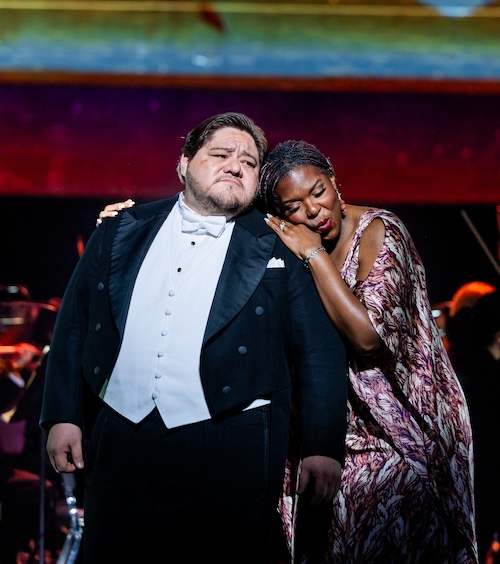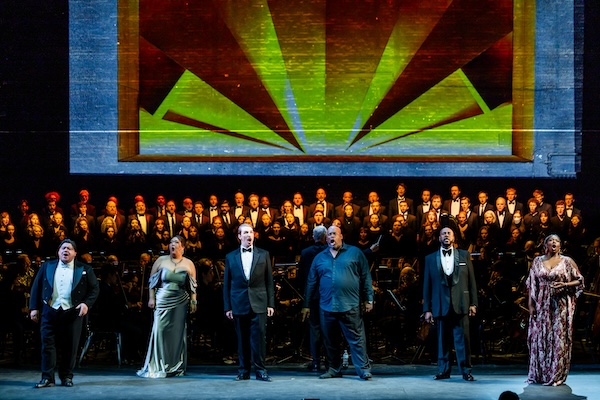Fine singers carry BLO’s concert “Aida” over rough edges

Diego Torre and Michelle Johnson starred in Boston Lyric Opera’s concert performance of Verdi’s Aida. Photo: Nile Scott Studios
What’s a production of Giuseppe Verdi’s Aida without elephants?
Cheaper and less complicated to put on than the alternative, for one. It was also the look Boston Lyric Opera went with for their one-afternoon-only, semi-staged presentation of the epic Sunday at the Emerson Colonial Theatre.
First heard in Cairo in 1871, Verdi’s score, which is set against the backdrop of a series of retributive wars between ancient Egypt and Ethiopia, is less a study in gaudy spectacle than a deeply personal meditation on the vagaries of desire and loyalty. At its heart are just three people: the title character; her mistress, Amneris; and Radamès, a charismatic Egyptian general who’s betrothed to the latter but in love with the former.
Premiered when Verdi was 58, Aida showcases a composer who, even in late-middle age, was as preternaturally fresh and inventive as ever. True, certain of its episodes–such as the “heavenly” harp arpeggios and high violin textures in Act 4–can get cloying and the parade in Act 2 borders on bombastic. But the music’s command of theatrical space is assured.
To be sure, some of Verdi’s writing, like the off-stage brasses in Act 2’s “Triumphal March” (where those elephants traditionally appear) anticipate effects in his later works, notably the Requiem of 1874. The recurring, trilling trumpet licks that crop up throughout the opera were likewise recycled, thrillingly, in that opus. Other spots, such as the distant choruses invoking the Egyptian deity Ptah, enchant with their unexpectedly seductive turns.
Where Aida occasionally shows its seams is in some of its characterizations. Though the female leads in Antonio Ghislanzoni’s libretto are well-rounded, the men are less compelling; Radamès, especially, comes over as something of a one-dimensional flake. Even so, he boasts some of Verdi’s greatest writing for a tenor.
On Sunday, Diego Torre proved more than a match for the role, singing with silvery tone and virile presence. Without once forcing his instrument to carry through the venue, Torre drew a range of shadings from his part, in moments both dreamy (“Celeste Aida”) and muscular (Act 3’s “Ah, no! Fuggiamo!”).
As his opposite number, Michelle Johnson’s Aida offered warmth, sympathy, and an impressive ability to effortlessly float high notes. While her singing in the first two acts didn’t exactly provide fire or distinction, the soprano’s appearances in Acts 3 and 4 dialed up the fervency. As a result, sparks flew, both in her several extended interactions with Torre and in the shorter ones with Brian Major’s suave Amonasro.
Meanwhile, Alice Chung’s Amneris commanded the eye and ear each time she was onstage. Dripping righteous indignation, her character’s furious Act 4 duet with Radamès delivered on the vocal and emotional fireworks, at its apex supplying some of the finest moments of pure theater BLO’s given us in recent memory.
Sunday was a special day for bass Morris Robinson, who marked the 25th anniversary of his BLO debut (also in Aida), with a stirring, stentorian portrayal of the high priest Ramfis. Fred C. Vanness, Jr. made the most of his short appearance as the Messenger while Stefan Egerstrom’s King was sturdy, if a bit stiff.
The BLO Chorus, supplemented by the Back Bay Chorale, fulfilled their onstage moments strongly–the Act 2 pageant swaggered majestically–while the off-stage ones veered between ethereal and blunt. In the latter, there was an inconsistent sense of both distance and mystery, though that probably owed more to the limitations of the space than anything else.
Oddly, given the setting in a theater, the BLO Orchestra and conductor David Angus were placed in the middle of the stage rather than in the Colonial’s pit. Accordingly, the ensemble’s sonority emerged as dry and brittle, instead of warm and plush.
In big moments, this didn’t matter so much: the climax of Act 2 built to a pleasing clatter. So did the culminating bars of Act 3.
But with nowhere to hide, quiet ones were fraught and intonation often haphazard. What’s more, the fusion of soloists, choir, and orchestra across the space sometimes sounded more scrappy than settled.
Still, Angus kept things moving and did his best to encourage good balances. The lovely Act 1 Prelude sang and, despite the risks involved, the orchestra’s attention to softer dynamics was, throughout the afternoon, admirable.
Perhaps the most welcome aspect of Sunday’s stripped-down, costume-less production was the fact that there wasn’t a stage director on hand to offer ham-fisted “improvements” on Verdi’s original.
Instead, staging coordinator Nathan Troup kept things simple with the cast utilizing the area in front of the orchestra above the covered pit. Aja M. Jackson’s lighting design was likewise straightforward, as were the Minimalist abstract shapes that constituted Jeff Grantz and Illuminus’s projection design.
To judge from the frequent chuckles and chattering heard on Sunday, the afternoon’s full house found more comedy in the opera’s various plot turns (and, once, Amneris’s haughty glare at Aida) than Verdi’s music suggested was there. But their applause was frequently loud, long, and well-placed.
And, when a medical emergency necessitated a brief pause in the middle of the Act 2 processional–a chorus member evidently fainted–the cries of medical advice from all corners of the theater (“Lay her down!” “Get her feet up!”) were heartening. Given the timing of the incident, it was another reason to be thankful that BLO had opted for an elephant-free Aida.
Boston Lyric Opera presents The Seasons March 12-16, 2025 at Emerson Paramount Center. blo.org
Posted in Performances

Posted Nov 16, 2024 at 3:35 am by Leda Lebedkina
It was a great Aida for Boston, a rarity. Indeed, the audience’s idiotic laughter in the most inappropriate moments testifies once more to the overall cultural barbarity of the land.